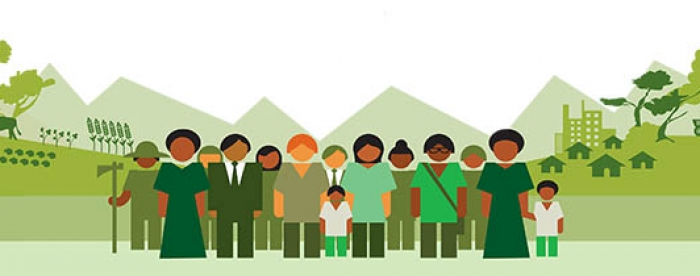This brief summarizes a participatory planning process that led to the development of six subcounty land use plans in three districts. It outlines the purpose and the process, compares two examples, and offers recommendations that will lead towards more sustainable land use that better reflect the needs and priorities of local communities in those subcounties and provides lessons for other districts to learn from.
Green Livelihoods Alliance - Forested Landscapes for Equity
A STRONG CIVIL SOCIETY FOR INCLUSIVE AND SUSTAINABLE DEVELOPMENT - Forested landscapes form the cornerstone of the livelihoods of about 1.2 billion people: almost 20% of the world’s population.
A large proportion of these people are among the poorest in the world. They are often particularly disadvantaged because their rights over land and natural resources are frequently ill-defined and far from assured. Forested landscapes are also crucially linked to the rest of the world: they provide natural services such as climate resilience, biodiversity, and food and water security. Despite these tremendous services, almost a third of the world’s forests have disappeared and another 20% of global forest cover is seriously degraded.
Deforestation
Unsustainable cultivation of food, animal feed and energy crops is one of the root causes of deforestation as the expansion of plantations leads to further deforestation and land degradation. Incentivized by agricultural and trade policies, international actors such as multinational corporations and investors are major drivers of forest loss. Still, also local communities and small, local companies can contribute heavily to loss and degradation of forests. Another important driver of deforestation and land degradation is the lack of political and private will to safeguard the critical functions that forests provide.
Inclusive and sustainable governance of forested landscapes
Scientific and empirical research shows that local communities have a crucial role to play in safeguarding productive forested landscapes. However, three conditions need to be met for communities to actually be able to play this role: (1) security of land tenure, or access to land, (2) inclusion in decision-making on land use by government and the local and international private sector, and (3) nature-based approaches to the management of forested landscapes to add to their traditional, time-proven knowledge. Once in place, these conditions enable local communities to engage with stakeholders from the public and private sector to jointly decide on land use. This is inclusive and sustainable governance of forested landscapes.
Capacity development for lobby and advocacy
For the three conditions to be met, the proper local, national and international legislation and corporate policies need to be in place. The Green Livelihoods Alliance (Milieudefensie, IUCN NL and Tropenbos International) seeks to strengthen the abilities and effectiveness of Southern civil society organizations (CSOs) to influence these policies and practices to achieve the inclusive and sustainable governance of forested landscapes. The core of the Alliance’s strategy, therefore, is to join CSOs in lobbying for and advocating inclusive and sustainable governance of forested landscapes and to strengthen the capacity of our partner CSOs to technically, politically and economically empower and represent local communities.
Visit the Green Livelihoods Alliance
Collaboration and confrontation
Where possible, through collaboration the Green Livelihoods Alliance will facilitate multi-stakeholder dialogues with a wider group of CSOs, local and international companies and governments to improve policies and practices. Where necessary, we will empower CSO partners to press public and private stakeholders for change.
Duration
2016 - 2020



